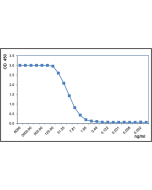Cookie Policy: This site uses cookies to improve your experience. You can find out more about our use of cookies in our Privacy Policy. By continuing to browse this site you agree to our use of cookies.
AdipoGen Life Sciences
anti-CD137L (human), mAb (41B436)

1: Recombinant humanCD137L (FLAG®-tagged).
2: Recombinant mouse CD137L (FLAG®-tagged).
| Product Details | |
|---|---|
| Synonyms | 4-1BBL; TNFSF9 |
| Product Type | Monoclonal Antibody |
| Properties | |
| Clone | 41B436 |
| Isotype | Mouse IgG1κ |
| Immunogen/Antigen | Recombinant human CD137L extracellular domain. |
| Application |
ELISA: (direct or indirect: 1:500-1:5'000) |
| Crossreactivity | Human |
| Specificity |
Recognizes extracellular domain of human CD137L. Does not cross-react with mouse CD137L. |
| Purity Detail | Protein G-affinity purified. |
| Concentration | 1mg/ml |
| Formulation | Liquid. 0.2μm-filtered solution in PBS, pH 7.4. Contains no preservatives. |
| Isotype Negative Control | |
| RRID | AB_2490113 |
| Shipping and Handling | |
| Shipping | BLUE ICE |
| Short Term Storage | +4°C |
| Long Term Storage | -20°C |
| Handling Advice |
After opening, prepare aliquots and store at -20°C. Avoid freeze/thaw cycles. |
| Use/Stability | Stable for at least 1 year after receipt when stored at -20°C. |
| Documents | |
| MSDS |
 Download PDF Download PDF |
| Product Specification Sheet | |
| Datasheet |
 Download PDF Download PDF |
The CD137 ligand (CD137L, 4-1BBL) is a member of the tumor necrosis factor (TNF) family. CD137L is a type II, transmembrane protein found on activated macrophages, dendritic cells and mature B cells. The interaction with its receptor 4-1BB induces recruitment of TNF receptor-associated factor 1 (TRAF1) and TRAF2 and interaction with the kinase p56lck. CD137 and CD137L have been reported to be involved in tumor rejection, apoptosis, anti-viral immunity, diabetes, in T and B cell co-stimulation and modulation of the immune response.
- Inhibition of proliferation and induction of apoptosis in multiple myeloma cell lines by CD137 ligand signaling: C. Gullo, et al.; PLoS One. 5, e10845 (2010)
- Tumor necrosis factor receptor 1 associates with CD137 ligand and mediates its reverse signaling: M.C. Moh, et al.; FASEB J. 27, 2957 (2013)
- Expression of CD137 on Hodgkin and Reed-Sternberg cells inhibits T-cell activation by eliminating CD137 ligand expression: W.T. Ho, et al.; Cancer Res. 73, 652 (2013)







